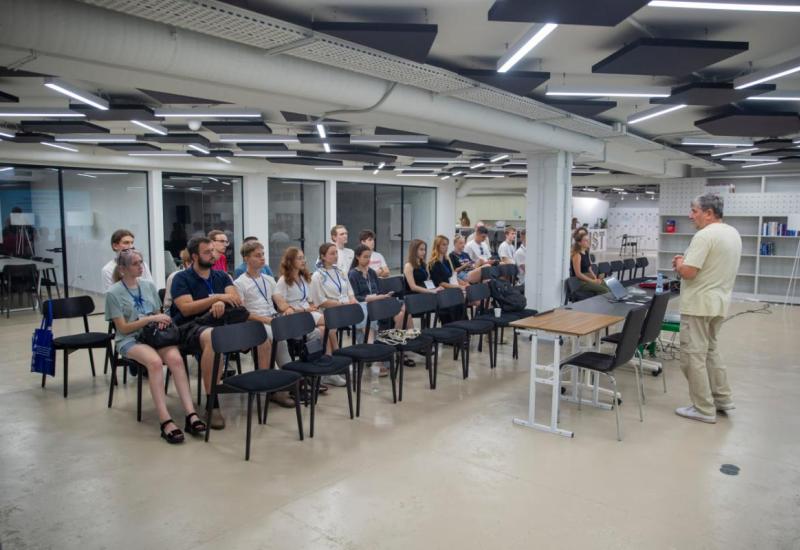Igor Sikorsky Kyiv Polytechnic Institute continues a series of bootcamps aimed at restoring Ukraine as part of the international project RESCUU. After last year's successful bootcamps, in July this year, the university hosted a bootcamp “Science and Innovation for the Revival of Ukraine”. Among its organizers were Uppsala University (Sweden), Poznan University of Technology (Poland), and the National University of Kyiv-Mohyla Academy. The event was held offline and online and included numerous lectures, panel discussions, and workshops. The event was attended by 32 representatives of various universities from several Ukrainian cities.
From July 8 to 12, 2024, students from different parts of Ukraine, together with experts, talked about the basics of civilian security, the role of modern technologies (artificial intelligence and 3D printing) in the post-war reconstruction of Ukraine, discussed the necessary changes in the most important areas of the country's life during and after the war, and formed their own vision of Ukraine's future. The participants also presented their own ideas for the revival of Ukraine. Below is an overview of the events that took place at the bootcamp in chronological order.
So, in the morning of the first day, the participants went on a tour of the KPI campus. The tour had to be interrupted due to a massive missile attack on Kyiv. The participants were promptly transferred to the CLUST SPACE multifunctional shelter. In the afternoon, the official opening ceremony of the bootcamp took place. Lyudmyla Babak, Project Coordinator of the Baltic University Program at Uppsala University, welcomed the participants and emphasized the importance of international cooperation in the revival of Ukraine. Candidate of Historical Sciences Yuriy Perha spoke on “Prospects for Ukraine's Integration into the Global Security Order Based on the Scenarios of the War's End”. He analyzed possible scenarios for the end of the war and their impact on Ukraine's future integration into the global community. The break was followed by a panel discussion, during which students had the opportunity to act as experts and discuss possible scenarios for Ukraine's future.
The second day of the bootcamp began with a panel discussion on “Humanitarian Demining - an Educational and Scientific Challenge for Ukraine”. Representatives of the State Labor Service, the Educational and Research Center for Innovative Humanitarian Demining Technologies and partners discussed the problems of demining in Ukraine. Then, the participants took part in the business game “Security Situation Modeling” conducted by Anzhela Pyatova, Senior Lecturer of the Department of CSCE of the ER IEE, Candidate of Sociological Sciences. The teams considered crisis situations, such as first aid and actions in the aftermath of an earthquake. In the afternoon, a practical section on 3D modeling took place. Danylo Prykhodko, the founder of the 3D laboratory, presented the history and practical application of 3D printing in various industries and conducted a practical lesson with the participants.
The third day began with lectures on artificial intelligence. Professors Oleksii Pysarchuk and Serhii Stirenko spoke about basic methods in AI and machine learning, emphasizing the importance of a deep understanding of mathematics to comprehend these disciplines. Viktor Karamushka, PhD in Biology, focused on environmental challenges, in particular, the consequences of the Kakhovka hydroelectric power plant tragedy. Vasyl Budko, Head of the Department of Renewable Energy at the FEA, spoke about the practical use of renewable energy, emphasizing the importance of the green tariff and the use of solar energy.
On the morning of the fourth day, Professor Rodney Stevens from the University of Gothenburg gave a presentation on “Project Evaluation with AI” and spoke about the main aspects of the use of artificial intelligence in research and shared his experience in using conceptual modeling.
An important part of the event was a panel discussion where participants discussed their ideas and visions for the future of Ukraine. Participants shared their diverse opinions and suggestions for the country's development, discussing the importance of volunteerism, education, technology, and environmental solutions. Each participant of the bootcamp had the opportunity to present his or her vision of Ukraine's future in the form of a pitch. One of them, a third-year student of the Institute of MMI, Yakiv Matskul, in a conversation with a KP correspondent, said: “I decided to come to the lectures and practical classes of the bootcamp because I hoped that after participating in it, I would have the opportunity to prove myself in the development of a certain project and, ultimately, benefit the country in this difficult time for the country and all of us. Now I am already specifically dealing with the problems of improving shelters, which I think is very important in the current situation.”
In the end, all participants received certificates of participation in the bootcamp.
Volodymyr Shkolnyi, according to the DMS
The final bootcamp within the international project RESCUU aims to unite students for the revival of Ukraine.
The organizers of the event include Uppsala University, Poznan University of Technology, and the National University of Kyiv-Mohyla Academy.
During the week, students from all over Ukraine will work with experts to improve their civilian security skills, learn how to use AI and 3D printing in reconstruction processes, and form their own vision of Ukraine's future. During the event, participants will also present their own ideas for the revival of Ukraine and receive feedback from international mentors.

